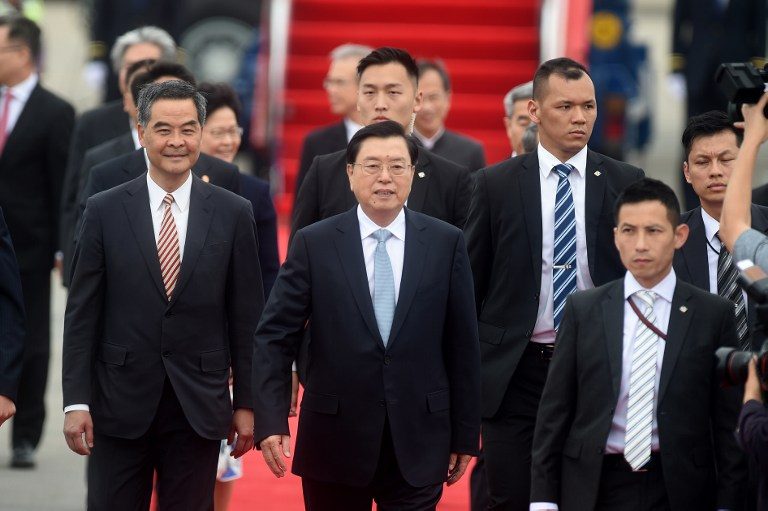SUMMARY
This is AI generated summarization, which may have errors. For context, always refer to the full article.

HONG KONG, China (UPDATED) – Hong Kong protesters angry at a visit by a top Beijing official shouted pro-democracy slogans and demanded free elections Wednesday, May 18, but were kept away from talks seen as an attempt to bridge a growing political divide.
The 3-day trip by Zhang Dejiang, who chairs China’s communist-controlled legislature, is the first by such a senior official in 4 years and comes as concerns grow that freedoms are under threat in semi-autonomous Hong Kong as Beijing tightens its grip.
Although Zhang’s trip is ostensibly for an economic conference, it is widely being seen as a conciliatory mission and a chance to gauge whether Beijing should back the city’s unpopular leader Leung Chun-ying to stand for a second term.
It comes as frustration over lack of reform has sparked a fledgling independence movement, condemned by authorities in Hong Kong and China.
Zhang will meet with pro-democracy lawmakers Wednesday evening in a rare move, after kicking off his visit Tuesday by promising to listen to political demands from across society.
But opponents have criticized Zhang for what they called “tokenistic” diplomacy and slammed Hong Kong authorities for putting parts of the city into a security lockdown for his visit.
Roads around Zhang’s hotel and the convention centre hosting the economic conference have been cordoned off with water-filled barricades and protesters funneled into designated areas, out of sight.
Around 100 protesters marched to one of the areas Wednesday morning before the conference started, vastly outnumbered by police – thousands of whom have been mobilized to protect Zhang.
They called for the “end of dictatorship”, fully free elections, and the release of Liu Xiaobo, a Chinese Nobel peace laureate jailed on the mainland, as well as the resignation of city leader Leung.
One woman was moved along by police as she waved a large Tibetan flag by one of the barricades.
“Our requests are very clear, we do not welcome Zhang,” said John Leung, 30, of the Hong Kong Confederation of Trade Unions.
‘Expression limited’
Rival groups of pro-China demonstrators waved national flags and heated shouting matches ensued between the two sides.
“Despite all, we are Chinese. Every policy and every government has its own imperfections,” said one pro-China protester who gave her name as Ms Yuan.
Demonstrators said they expected higher numbers for an evening rally.
Some said fear of a backlash had kept numbers away in the morning.
“I think more people are scared of the police,” said Alexandra Wong, 60, a retired accountant.
“They do what they want.”
Hong Kong police were criticized for heavy-handed treatment of protesters during massive pro-democracy rallies that brought parts of the city to a standstill in 2014.
Police arrested seven members of the pro-democracy League of Social Democrats party on Tuesday, May 17, for unfurling protest banners on hills and flyovers.
They also wrestled a leading pro-democracy activist to the ground near Zhang’s hotel as he tried to breach a barrier.
Human Rights Watch said Wednesday authorities had “sharply limited” the public’s opportunities to voice criticism of Zhang’s visit.
It also said Hong Kong officials should challenge Zhang “to make concrete commitments to respect Hong Kong’s autonomy on human rights and democratic rule”.
Hong Kong is semi-autonomous after being handed back to China by Britain in 1997 and enjoys freedoms unseen on the mainland, but there are concerns Beijing interference is growing.
Speaking at the economic forum Wednesday, Zhang said Hong Kong should participate more in China’s national development strategy.
“I hope that Hong Kong, with a broader mind and vision, will fully seize the major opportunities,” he said.
He emphasized the shared Cantonese culture of southern China and Hong Kong, an apparent bid to ease fears Beijing is trying to eradicate the city’s identity.
Hongkongers speak Cantonese, rather than the Mandarin dominant on the mainland, and there are concerns the language is being squeezed out. – Aaron Tam and Dennis Chong, AFP / Rappler.com
Add a comment
How does this make you feel?
There are no comments yet. Add your comment to start the conversation.